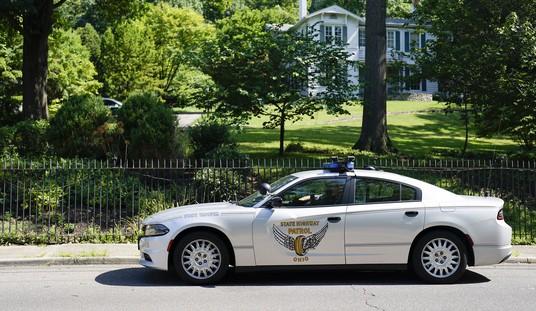When two boats carrying 44 international activists landed last Saturday night on a Gaza beach, successfully challenging Israel’s blockade of the Hamas-ruled Palestinian territory, it was supposed to be a major media event.
The SS Free Gaza and the SS Free Liberty, converted fishing boats decorated with Palestinian flags and banners emblazoned with slogans like “end occupation,” sailed from Larnaca port in Cyprus, following a search by Cypriot port authorities that was carried out at the request of Israel. The boats carried hearing aids and balloons — a symbolic cargo for a symbolic event that was intended to draw attention to the situation in Gaza.
In a telephone interview with PJM, Jeff Halper, the only Israeli Jew in the group, declared the operation a success, despite the general lack of western media attention. “The point was to force the Israeli government to make a choice. They cannot say that they are no longer occupying Gaza, while maintaining control of its borders. If they had prevented us from landing in Gaza, they would have been admitting that they still occupy Gaza. By allowing us to land, they have relinquished control of Gaza’s territorial waters and set a precedent.”
The blockade-busting event was organized by the California-based Free Gaza organization, but the activists were a mixed group of Europeans and Americans. They included Lauren Booth, sister-in-law of former British prime minister-turned-Middle East-envoy Tony Blair; Anne Montgomery, an 84 year-old American nun; ultra-eccentric British journalist Yvonne Ridley; and Israeli-American academic Jeff Halper, 62, who co-founded the Israeli Committee Against House Demolitions.
Israel imposed a blockade on Gaza in June 2007, declaring it a “hostile entity” after Hamas, which is considered a terror organization by the EU, USA and Israel, seized control of the territory in a bloody civil war against Fatah. The Hamas takeover was followed by more frequent and intense barrages of Qassams, which Gazan militants began launching on Sderot and the western Negev farming communities as far back as 2000.
Israel occupied Gaza in 1967, following the Six Day War. It withdrew its army and settlements in 2005, but maintained control over Gaza’s borders and territorial waters.
Currently Israel allows medicine and basic humanitarian supplies into Gaza, but fuel is very limited and there are shortages of all sorts of goods — ranging from schoolbooks to construction materials.
Few Gazans are able to gain permission to leave the territory — either through the checkpoints leading into Israel, or through the Rafah border crossing that leads into Egypt and is jointly controlled by Israel and Egyptian authorities.
On the other hand, quite a few residents of Rafah are becoming rich from smuggling goods, ranging from cigarettes to tigers for the zoo, through tunnels they dig under the border fence. And many Palestinians with serious illnesses or gunshot wounds are treated at Israeli hospitals.
Opponents of the blockade call it collective punishment of Gaza’s 1.5 million civilians. Supporters of the blockade say it is the only way to prevent the import of weapons and to pressure the Hamas-led government into halting its attacks on Israeli territory.
Jerusalem-based Free Gaza spokeswoman Angela Godfrey-Goldstein kept reporters apprised of the 30-hour journey’s progress via rather breathless emails sent several times a day. A correspondent for the BBC News wrote a couple of diary entry reports about preparations for the trip in Cyprus, too. Democracy Now’s Amy Goodman did a podcast interview that is posted here (with accompanying transcript).
Al Jazeera loved the story, even doing a 25-minute Inside Story report about it — complete with a screaming match between former Israeli government spokesman Raanan Gissin (a.k.a. “the Rotweiler”) and International Solidarity Movement co-founder Huwaida Arraf. Part one of the AJ report is here; part two is here.
The Israeli media pretty much ignored the story — except for Haaretz, of course. And the international media lost interest as soon as Israel announced it did not intend to stop the boats from landing or its passengers from disembarking. (No blood, no story.)
So the boats landed without incident. After basking in the excited greetings of several hundred Palestinians who gathered on the beach, the passengers disembarked and went off to visit Hamas leader Ismail Haniyeh.
Halper, the Israeli Jew in the group, declined to meet Haniyeh. Instead he made his way back to Israel, via Erez Crossing. Since Israeli citizens — even those who hold foreign citizenship — are prohibited from entering Gaza, Halper was detained by Israeli police and taken for questioning at Ashkelon police station. Ultimately the police decided to arrest Halper and hold him overnight in lockup. He was arraigned today in court and is currently out on bail while the attorney general decides whether or not to indict him.
Halper told PJM that he chose not to meet Haniyeh because he wanted to keep the focus on Israel. “If I had met with Haniyeh, all the media attention would have been on that instead of on what I really came to highlight, which is the blockade.”
Asked whether he didn’t think that being associated with kooky people like Yvonne Ridley detracted from Free Gaza’s credibility, Halper answered, “Oh, she was not the kookiest one on board.” But he added, “You cannot control every person who joins an organization. I think we’re a solid group and we really accomplished something positive.”
For many observers, however, the Free Gaza expedition was nothing more than a pointless media stunt. It garnered little international media attention, did not improve the lives of Gazans, and is unlikely to result in the Israeli authorities’ deciding to relinquish control of Gaza’s borders. Nor is Hamas likely to disavow terror or recognize Israel’s right to exist.
In a region where violence and political upheaval are daily occurrences, it will take more than a media event to effect real change.









Join the conversation as a VIP Member